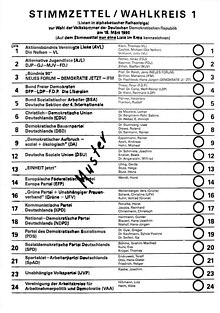Thomas Klein | |
|---|---|
| Member of the German Bundestag | |
| In office October 1990 – December 1990 | |
| Member of the Volkskammer | |
| In office March 1990 – October 1990 | |
| Personal details | |
| Born | April 14, 1948 Berlin, Germany |
| Political party | The Left United Left |
| Alma mater | Humboldt University of Berlin |
Thomas Klein (born April 14, 1948) is a German civil rights activist, historian, and politician.
Life
[edit]Klein was born in Berlin on April 14, 1948. He trained as an electrical mechanic before enrolling at Humboldt University to study mathematics, where he received his doctorate in 1976. Meanwhile, Klein had begun working at the Central Institute for Economic Sciences, part of the Academy of Sciences of the GDR, in 1973. During the 1970s, Klein began to associate with opposition groups in the German Democratic Republic. As a result, he was arrested by the Stasi in September 1979, and taken to Berlin-Hohenschönhausen Prison. Klein was convicted of "unlawful contact" ("ungesetzlicher Verbindungsaufnahme") under section 219 of the East German criminal code.[1] During his trial, Gregor Gysi served as his lawyer.[2] He was held in the Bautzen II prison until his release in December 1980. Following his release, Klein was banned from working in the sciences, and was assigned to work at a state-owned furniture company.[1]
In 1987, Klein was a founding member of the opposition Gegenstimmen Group. The group brought together leftist opponents of the ruling Socialist Unity Party, and included Marxists, Titoists, Trotskyites, and members of the Christian left. In a report from 1989, the Stasi counted Klein among the most ardent members of the opposition.[3]
In 1989, Klein was one of the founding members of the United Left, and a co-author of the party's "Böhlener Platform".[2][4][5] In the 1990 East German election, he was the United Left's lead candidate, and was the only member of the party elected to the Volkskammer.[6] When Germany reunited, Klein then became a member of the Bundestag until a new federal election was held on December 2, 1990.[7] The United Left began to disintegrate following German reunification, and during the 2000s Klein joined Die Linke.

Following his time as a member of the Bundestag, Klein then spent two years as an employee of the Bundestag. From 1996 to 2009 he worked at the Centre for Contemporary History in Potsdam as a historian specializing in the history of the German Democratic Republic and its opposition movements. In the course of this work, he has authored five books on East German political history.
References
[edit]- ^ a b Müller, Silvia (2010). "Klein, Thomas". Wer war wer in der DDR? [Who was who in the GDR?] (in German). Vol. 1 (5th ed.). Berlin: Ch. Links Verlag. ISBN 978-3-86153-561-4.
- ^ a b "Thomas Klein". ddr89.de. Retrieved 2024-02-02.
- ^ Bericht über Größe und Zusammensetzung der ostdeutschen Opposition [Report on the size and composition of the East German opposition] (PDF) (Report) (in German). Ministry for State Security. 1981-06-01. p. 3. Retrieved 2024-02-02.
- ^ Bähr, Sebastian (2019-10-07). "Geschichtsvergessenheit stärkt die AfD". Neues Deutschland (in German). Retrieved 2024-02-02.
- ^ Schmidtk, Elke; Steiniger, Klaus (1990-02-08). "Aktionsbündnis für eine sozialistische Alternative: Im Gespräch mit Dr. Thomas Klein, Vereinigte Linke". Neues Deutschland (in German). Vol. 45 (33 ed.). Retrieved 2024-02-02.
- ^ Kelz, Christopher (2020-08-01). "Basisdemokratischer Freiheitlicher Sozialismus DDR 1989" (PDF). Sozialistische Alternative DDR 89: Die Initiative für eine Vereinigte Linke in Texten und Dokumenten (in German). 1 (1). Rosa Luxemburg Foundation: 31–46.
- ^ Mayer, Hendrik (2020-08-01). ""Unser Kopf ist rund, damit das denken die richtung andern kann": Werkstattbericht zur Aufarbeitung von Materielen der Vereinigten Linken Rostock" (PDF). Sozialistische Alternative DDR 89: Die Initiative für eine Vereinigte Linke in Texten und Dokumenten (in German). 1 (1): 47–65.